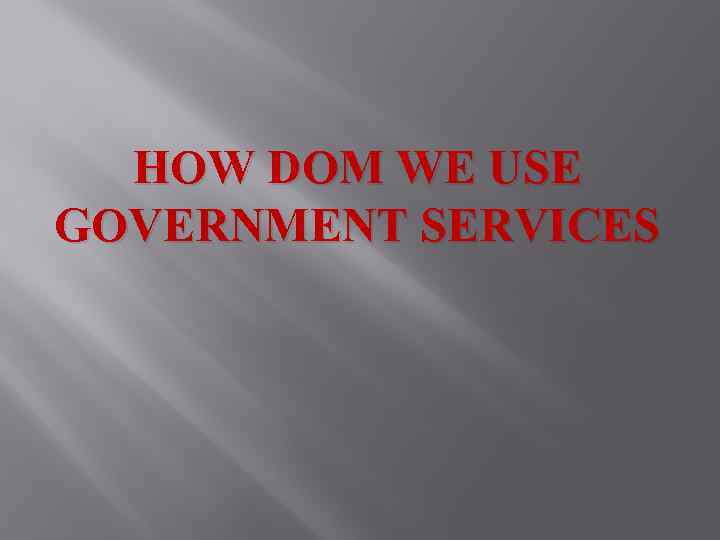 HOW DOM WE USE GOVERNMENT SERVICES
HOW DOM WE USE GOVERNMENT SERVICES
 Our Terms of Use Imagine a world in which every single human being can freely share in the sum of all knowledge. That's our commitment. – Our Vision Statement Welcome to Wikimedia! The Wikimedia Foundation, Inc. (“we” or “us”), is a nonprofit charitable organization whose mission is to empower and engage people around the world to collect and develop content under a free license or in the public domain, and to disseminate it effectively and globally, free of charge. To support our vibrant community, we provide the essential infrastructure and organizational framework for the development of multilingual wiki Projects and their editions (as explained here) and other endeavors which serve this mission. We strive to make and keep educational and informational content from the Projects available on the internet free of charge, in perpetuity. We welcome you (“you” or the “user”) as a reader, editor, author, or contributor of the Wikimedia Projects, and we encourage you to join the Wikimedia community. Before you participate, however, we ask that you please read and agree to the following Terms of Use (“Terms of Use”).
Our Terms of Use Imagine a world in which every single human being can freely share in the sum of all knowledge. That's our commitment. – Our Vision Statement Welcome to Wikimedia! The Wikimedia Foundation, Inc. (“we” or “us”), is a nonprofit charitable organization whose mission is to empower and engage people around the world to collect and develop content under a free license or in the public domain, and to disseminate it effectively and globally, free of charge. To support our vibrant community, we provide the essential infrastructure and organizational framework for the development of multilingual wiki Projects and their editions (as explained here) and other endeavors which serve this mission. We strive to make and keep educational and informational content from the Projects available on the internet free of charge, in perpetuity. We welcome you (“you” or the “user”) as a reader, editor, author, or contributor of the Wikimedia Projects, and we encourage you to join the Wikimedia community. Before you participate, however, we ask that you please read and agree to the following Terms of Use (“Terms of Use”).
 Overview These Terms of Use tell you about our public services at the Wikimedia Foundation, our relationship to you as a user, and the rights and responsibilities that guide us both. We want you to know that we host an incredible quantity of educational and informational content, all of which is contributed and made possible by users like yourself. Generally we do not contribute, monitor, or delete content (with the rare exception of policies like these Terms of Use or legal compliance for DMCA notices). This means that editorial control is in the hands of you and your fellow users who create and manage the content. We merely host this content. The community – the network of users who are constantly building and using the various sites or Projects – are the principal means through which the goals of the mission are achieved. The community contributes to and helps govern our sites. The community undertakes the critical function of creating and enforcing policies for the specific Project editions (such as the different language editions for the Wikipedia Project or the Wikimedia Commons multi-lingual edition).
Overview These Terms of Use tell you about our public services at the Wikimedia Foundation, our relationship to you as a user, and the rights and responsibilities that guide us both. We want you to know that we host an incredible quantity of educational and informational content, all of which is contributed and made possible by users like yourself. Generally we do not contribute, monitor, or delete content (with the rare exception of policies like these Terms of Use or legal compliance for DMCA notices). This means that editorial control is in the hands of you and your fellow users who create and manage the content. We merely host this content. The community – the network of users who are constantly building and using the various sites or Projects – are the principal means through which the goals of the mission are achieved. The community contributes to and helps govern our sites. The community undertakes the critical function of creating and enforcing policies for the specific Project editions (such as the different language editions for the Wikipedia Project or the Wikimedia Commons multi-lingual edition).
![Contents [hide] Our Terms of Use Overview 1. Our Services 2. Privacy Policy 3. Contents [hide] Our Terms of Use Overview 1. Our Services 2. Privacy Policy 3.](https://present5.com/presentation/1/367430069_455569084.pdf-img/367430069_455569084.pdf-4.jpg) Contents [hide] Our Terms of Use Overview 1. Our Services 2. Privacy Policy 3. Content We Host 4. Refraining from Certain Activities 5. Password Security 6. Trademarks 7. Licensing of Content 8. DMCA Compliance 9. Third-party Websites and Resources 11. Resolutions and Project Policies 12. Termination 13. Disputes and Jurisdiction 14. Disclaimers 15. Limitation on Liability 16. Modifications to these Terms of Use 17. Other Terms
Contents [hide] Our Terms of Use Overview 1. Our Services 2. Privacy Policy 3. Content We Host 4. Refraining from Certain Activities 5. Password Security 6. Trademarks 7. Licensing of Content 8. DMCA Compliance 9. Third-party Websites and Resources 11. Resolutions and Project Policies 12. Termination 13. Disputes and Jurisdiction 14. Disclaimers 15. Limitation on Liability 16. Modifications to these Terms of Use 17. Other Terms
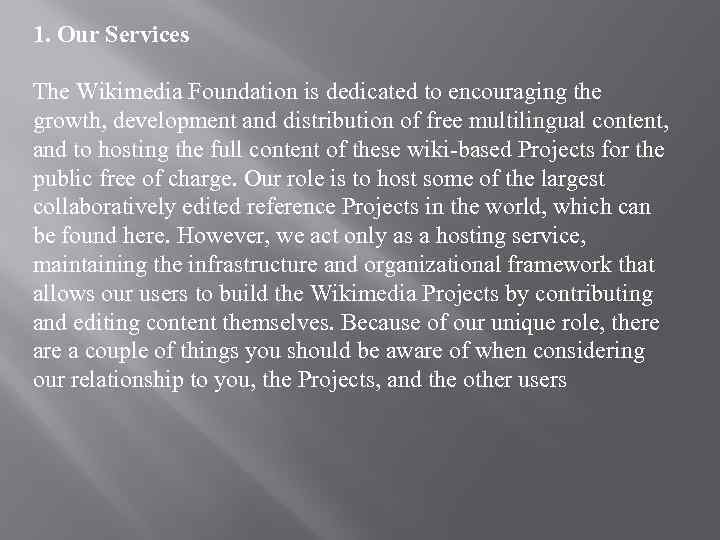 1. Our Services The Wikimedia Foundation is dedicated to encouraging the growth, development and distribution of free multilingual content, and to hosting the full content of these wiki-based Projects for the public free of charge. Our role is to host some of the largest collaboratively edited reference Projects in the world, which can be found here. However, we act only as a hosting service, maintaining the infrastructure and organizational framework that allows our users to build the Wikimedia Projects by contributing and editing content themselves. Because of our unique role, there a couple of things you should be aware of when considering our relationship to you, the Projects, and the other users
1. Our Services The Wikimedia Foundation is dedicated to encouraging the growth, development and distribution of free multilingual content, and to hosting the full content of these wiki-based Projects for the public free of charge. Our role is to host some of the largest collaboratively edited reference Projects in the world, which can be found here. However, we act only as a hosting service, maintaining the infrastructure and organizational framework that allows our users to build the Wikimedia Projects by contributing and editing content themselves. Because of our unique role, there a couple of things you should be aware of when considering our relationship to you, the Projects, and the other users
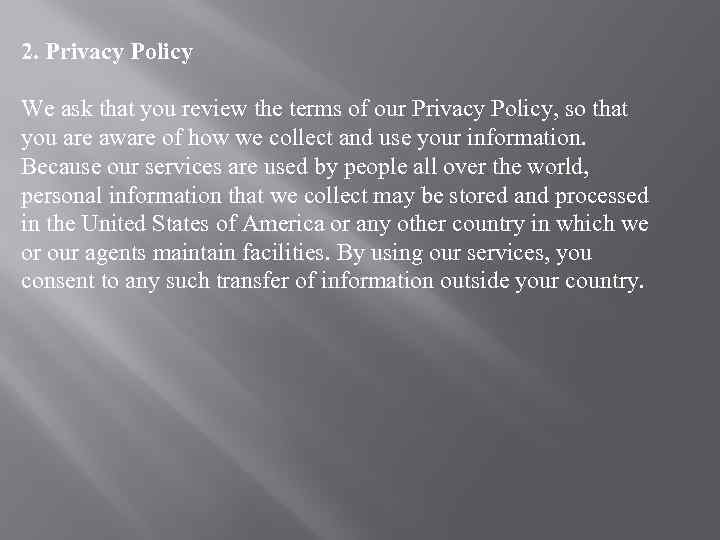 2. Privacy Policy We ask that you review the terms of our Privacy Policy, so that you are aware of how we collect and use your information. Because our services are used by people all over the world, personal information that we collect may be stored and processed in the United States of America or any other country in which we or our agents maintain facilities. By using our services, you consent to any such transfer of information outside your country.
2. Privacy Policy We ask that you review the terms of our Privacy Policy, so that you are aware of how we collect and use your information. Because our services are used by people all over the world, personal information that we collect may be stored and processed in the United States of America or any other country in which we or our agents maintain facilities. By using our services, you consent to any such transfer of information outside your country.
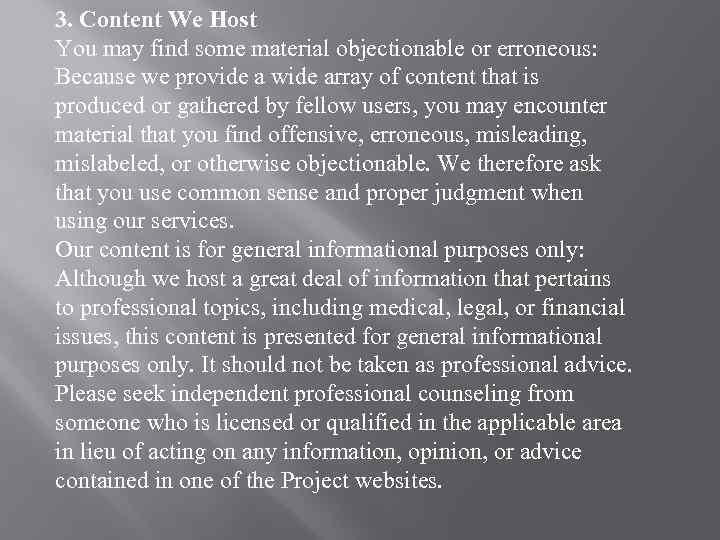 3. Content We Host You may find some material objectionable or erroneous: Because we provide a wide array of content that is produced or gathered by fellow users, you may encounter material that you find offensive, erroneous, misleading, mislabeled, or otherwise objectionable. We therefore ask that you use common sense and proper judgment when using our services. Our content is for general informational purposes only: Although we host a great deal of information that pertains to professional topics, including medical, legal, or financial issues, this content is presented for general informational purposes only. It should not be taken as professional advice. Please seek independent professional counseling from someone who is licensed or qualified in the applicable area in lieu of acting on any information, opinion, or advice contained in one of the Project websites.
3. Content We Host You may find some material objectionable or erroneous: Because we provide a wide array of content that is produced or gathered by fellow users, you may encounter material that you find offensive, erroneous, misleading, mislabeled, or otherwise objectionable. We therefore ask that you use common sense and proper judgment when using our services. Our content is for general informational purposes only: Although we host a great deal of information that pertains to professional topics, including medical, legal, or financial issues, this content is presented for general informational purposes only. It should not be taken as professional advice. Please seek independent professional counseling from someone who is licensed or qualified in the applicable area in lieu of acting on any information, opinion, or advice contained in one of the Project websites.
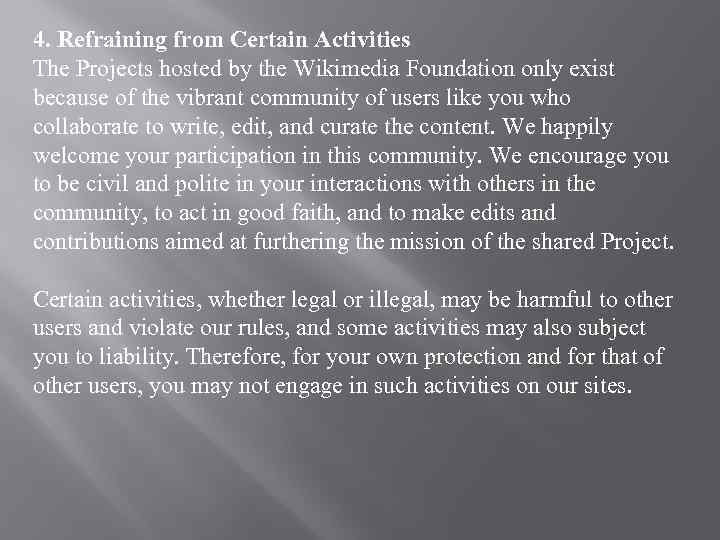 4. Refraining from Certain Activities The Projects hosted by the Wikimedia Foundation only exist because of the vibrant community of users like you who collaborate to write, edit, and curate the content. We happily welcome your participation in this community. We encourage you to be civil and polite in your interactions with others in the community, to act in good faith, and to make edits and contributions aimed at furthering the mission of the shared Project. Certain activities, whether legal or illegal, may be harmful to other users and violate our rules, and some activities may also subject you to liability. Therefore, for your own protection and for that of other users, you may not engage in such activities on our sites.
4. Refraining from Certain Activities The Projects hosted by the Wikimedia Foundation only exist because of the vibrant community of users like you who collaborate to write, edit, and curate the content. We happily welcome your participation in this community. We encourage you to be civil and polite in your interactions with others in the community, to act in good faith, and to make edits and contributions aimed at furthering the mission of the shared Project. Certain activities, whether legal or illegal, may be harmful to other users and violate our rules, and some activities may also subject you to liability. Therefore, for your own protection and for that of other users, you may not engage in such activities on our sites.
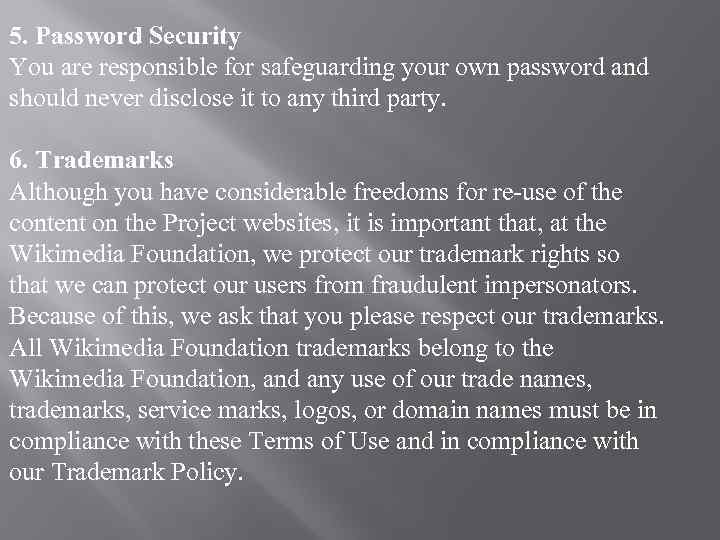 5. Password Security You are responsible for safeguarding your own password and should never disclose it to any third party. 6. Trademarks Although you have considerable freedoms for re-use of the content on the Project websites, it is important that, at the Wikimedia Foundation, we protect our trademark rights so that we can protect our users from fraudulent impersonators. Because of this, we ask that you please respect our trademarks. All Wikimedia Foundation trademarks belong to the Wikimedia Foundation, and any use of our trade names, trademarks, service marks, logos, or domain names must be in compliance with these Terms of Use and in compliance with our Trademark Policy.
5. Password Security You are responsible for safeguarding your own password and should never disclose it to any third party. 6. Trademarks Although you have considerable freedoms for re-use of the content on the Project websites, it is important that, at the Wikimedia Foundation, we protect our trademark rights so that we can protect our users from fraudulent impersonators. Because of this, we ask that you please respect our trademarks. All Wikimedia Foundation trademarks belong to the Wikimedia Foundation, and any use of our trade names, trademarks, service marks, logos, or domain names must be in compliance with these Terms of Use and in compliance with our Trademark Policy.
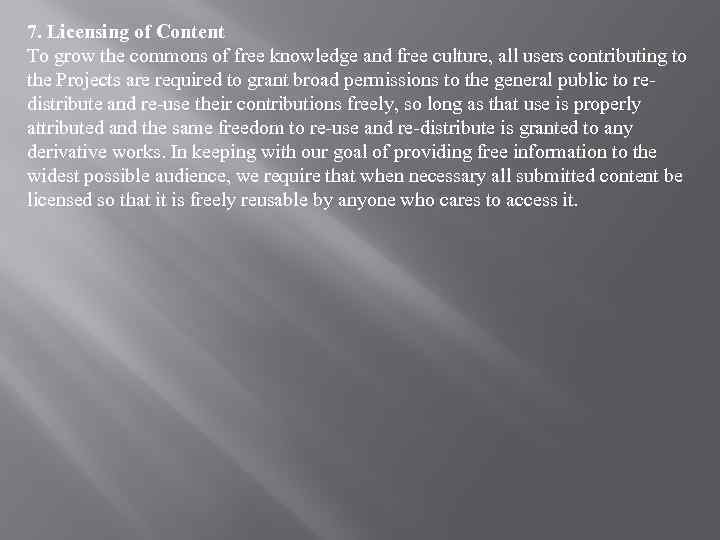 7. Licensing of Content To grow the commons of free knowledge and free culture, all users contributing to the Projects are required to grant broad permissions to the general public to redistribute and re-use their contributions freely, so long as that use is properly attributed and the same freedom to re-use and re-distribute is granted to any derivative works. In keeping with our goal of providing free information to the widest possible audience, we require that when necessary all submitted content be licensed so that it is freely reusable by anyone who cares to access it.
7. Licensing of Content To grow the commons of free knowledge and free culture, all users contributing to the Projects are required to grant broad permissions to the general public to redistribute and re-use their contributions freely, so long as that use is properly attributed and the same freedom to re-use and re-distribute is granted to any derivative works. In keeping with our goal of providing free information to the widest possible audience, we require that when necessary all submitted content be licensed so that it is freely reusable by anyone who cares to access it.
 8. DMCA Compliance The Wikimedia Foundation wants to ensure that the content that we host can be reused by other users without fear of liability and that it is not infringing the proprietary rights of others. In fairness to our users, as well as to other creators and copyright holders, our policy is to respond to notices of alleged infringement that comply with the formalities of the Digital Millennium Copyright Act (DMCA). Pursuant to the DMCA, we will terminate, in appropriate circumstances, users and account holders of our system and network who are repeat infringers. However, we also recognize that not every takedown notice is valid or in good faith. In such cases, we strongly encourage users to file counter-notifications when they appropriately believe a DMCA takedown demand is invalid or improper. For more information on what to do if you think a DMCA notice has been improperly filed, you may wish to consult the Chilling Effects website.
8. DMCA Compliance The Wikimedia Foundation wants to ensure that the content that we host can be reused by other users without fear of liability and that it is not infringing the proprietary rights of others. In fairness to our users, as well as to other creators and copyright holders, our policy is to respond to notices of alleged infringement that comply with the formalities of the Digital Millennium Copyright Act (DMCA). Pursuant to the DMCA, we will terminate, in appropriate circumstances, users and account holders of our system and network who are repeat infringers. However, we also recognize that not every takedown notice is valid or in good faith. In such cases, we strongly encourage users to file counter-notifications when they appropriately believe a DMCA takedown demand is invalid or improper. For more information on what to do if you think a DMCA notice has been improperly filed, you may wish to consult the Chilling Effects website.
 9. Third-party Websites and Resources You are solely responsible for your use of any third-party websites or resources. Although the Projects contain links to third-party websites and resources, we do not endorse and are not responsible or liable for their availability, accuracy, or the related content, products, or services (including, without limitation, any viruses or other disabling features), nor do we have any obligation to monitor such third-party content. 10. Management of Websites The community has the primary role in creating and enforcing policies applying to the different Project editions. At the Wikimedia Foundation, we rarely intervene in community decisions about policy and its enforcement. In an unusual case, the need may arise, or the community may ask us, to address an especially problematic user because of significant Project disturbance or dangerous behavior.
9. Third-party Websites and Resources You are solely responsible for your use of any third-party websites or resources. Although the Projects contain links to third-party websites and resources, we do not endorse and are not responsible or liable for their availability, accuracy, or the related content, products, or services (including, without limitation, any viruses or other disabling features), nor do we have any obligation to monitor such third-party content. 10. Management of Websites The community has the primary role in creating and enforcing policies applying to the different Project editions. At the Wikimedia Foundation, we rarely intervene in community decisions about policy and its enforcement. In an unusual case, the need may arise, or the community may ask us, to address an especially problematic user because of significant Project disturbance or dangerous behavior.
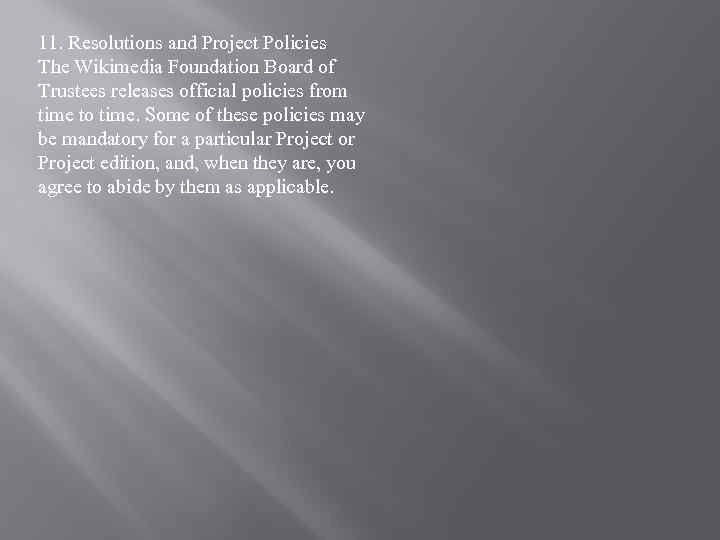 11. Resolutions and Project Policies The Wikimedia Foundation Board of Trustees releases official policies from time to time. Some of these policies may be mandatory for a particular Project or Project edition, and, when they are, you agree to abide by them as applicable.
11. Resolutions and Project Policies The Wikimedia Foundation Board of Trustees releases official policies from time to time. Some of these policies may be mandatory for a particular Project or Project edition, and, when they are, you agree to abide by them as applicable.
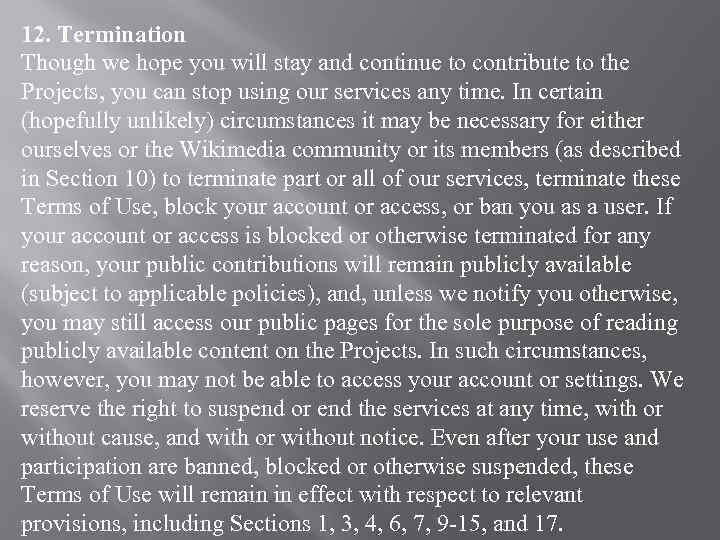 12. Termination Though we hope you will stay and continue to contribute to the Projects, you can stop using our services any time. In certain (hopefully unlikely) circumstances it may be necessary for either ourselves or the Wikimedia community or its members (as described in Section 10) to terminate part or all of our services, terminate these Terms of Use, block your account or access, or ban you as a user. If your account or access is blocked or otherwise terminated for any reason, your public contributions will remain publicly available (subject to applicable policies), and, unless we notify you otherwise, you may still access our public pages for the sole purpose of reading publicly available content on the Projects. In such circumstances, however, you may not be able to access your account or settings. We reserve the right to suspend or end the services at any time, with or without cause, and with or without notice. Even after your use and participation are banned, blocked or otherwise suspended, these Terms of Use will remain in effect with respect to relevant provisions, including Sections 1, 3, 4, 6, 7, 9 -15, and 17.
12. Termination Though we hope you will stay and continue to contribute to the Projects, you can stop using our services any time. In certain (hopefully unlikely) circumstances it may be necessary for either ourselves or the Wikimedia community or its members (as described in Section 10) to terminate part or all of our services, terminate these Terms of Use, block your account or access, or ban you as a user. If your account or access is blocked or otherwise terminated for any reason, your public contributions will remain publicly available (subject to applicable policies), and, unless we notify you otherwise, you may still access our public pages for the sole purpose of reading publicly available content on the Projects. In such circumstances, however, you may not be able to access your account or settings. We reserve the right to suspend or end the services at any time, with or without cause, and with or without notice. Even after your use and participation are banned, blocked or otherwise suspended, these Terms of Use will remain in effect with respect to relevant provisions, including Sections 1, 3, 4, 6, 7, 9 -15, and 17.


